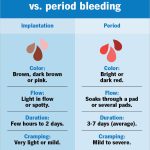Bleeding After Sex and Missed Period: Understanding the Causes and Concerns
A sudden, unexplained change in your menstrual cycle can be a distressing experience. Whether it’s bleeding after sex or missing a period entirely, these irregularities can leave you feeling anxious, concerned, and unsure of what to do next.
As women, we’re often taught that our bodies are unpredictable and that certain physical changes are simply part of the natural process. But what if these changes signal something more serious? In this blog post, we’ll delve into the causes and concerns surrounding bleeding after sex and missed periods, empowering you with the knowledge to take control of your reproductive health.
What’s Normal, What’s Not?
Let’s start by defining what is considered “normal” when it comes to menstruation. Typically, a woman’s period arrives like clockwork every 28 days or so, with some variation depending on factors such as hormonal fluctuations, stress levels, and overall health. However, when bleeding occurs outside of this window – say, after intercourse – or periods cease altogether without explanation, alarm bells start ringing.
In the next section, we’ll explore the possible reasons behind these irregularities, including physical and emotional factors that might be contributing to your symptoms. Whether you’re experiencing stress-induced amenorrhea, hormonal imbalances, or something more serious like polycystic ovary syndrome (PCOS), understanding the root causes will help you take the first step towards regaining control over your body.
The Physical and Emotional Factors Behind Bleeding After Sex
Bleeding after sex, also known as postcoital bleeding (PCB), can be caused by a variety of physical and emotional factors. Some common reasons include:
- Hormonal changes: Fluctuations in estrogen and progesterone levels can cause irregular bleeding or spotting.
- Endometrial polyps or hyperplasia: Non-cancerous growths on the lining of the uterus can lead to abnormal bleeding.
- IUD insertion or removal: Some women may experience light bleeding or spotting after getting an intrauterine device (IUD) inserted or removed.
- Cervical or vaginal tears: Trauma during sex, such as rough play or using sex toys, can cause minor tears in the cervix or vagina, leading to bleeding.
- Sexually transmitted infections (STIs): Certain STIs like chlamydia or gonorrhea can cause abnormal bleeding.
- Pregnancy complications: Women who are experiencing a miscarriage or ectopic pregnancy may experience bleeding after sex.
In addition to these physical factors, emotional stress and anxiety can also contribute to bleeding after sex. For example:
- Stress-induced amenorrhea: High levels of stress can disrupt hormonal balances, leading to missed periods or irregular bleeding.
- Anxiety and depression: Mental health conditions can affect physical symptoms like menstruation and cause abnormal bleeding.
It’s essential to consult a healthcare provider if you experience recurring or heavy bleeding after sex. A professional evaluation can help identify the underlying cause and provide appropriate treatment options.
The Concerns Surrounding Missed Periods
A missed period can be a concerning symptom, especially when it’s accompanied by other physical changes like breast tenderness, mood swings, or fatigue. Some possible causes of missed periods include:
- Pregnancy: The most common cause of a missed period is pregnancy.
- Hormonal imbalances: Polycystic ovary syndrome (PCOS), thyroid disorders, and other hormonal conditions can disrupt menstrual cycles.
- Polyps or fibroids: Non-cancerous growths on the uterus or cervix can cause irregular bleeding or missed periods.
- IUD use: Some women may experience skipped periods while using certain types of IUDs.
- Menopause: Women approaching menopause may experience irregular menstrual cycles as hormone levels fluctuate.
A missed period can also be a sign of an underlying medical condition, such as:
- Ectopic pregnancy: A life-threatening condition in which the fertilized egg implants outside the uterus.
- Endometrial cancer: A rare but serious condition that requires prompt medical attention.
If you’ve experienced a missed period or unusual bleeding, it’s crucial to consult a healthcare provider for a thorough evaluation and guidance on next steps.
In our next section, we’ll explore the steps you can take to address bleeding after sex and missed periods. From scheduling appointments with your healthcare provider to making lifestyle changes, we’ll provide actionable advice to help you regain control over your reproductive health.
Consult a Medical Professional
If you’re experiencing bleeding after sex or missed periods, it’s essential to consult with a medical professional for personalized guidance and support.
Get Expert AdviceBleeding After Sex and Missed Period: Understanding the Causes and Concerns
A sudden, unexplained change in your menstrual cycle can be a distressing experience. Whether it’s bleeding after sex or missing a period entirely, these irregularities can leave you feeling anxious, concerned, and unsure of what to do next.
As women, we’re often taught that our bodies are unpredictable and that certain physical changes are simply part of the natural process. But what if these changes signal something more serious? In this blog post, we’ll delve into the causes and concerns surrounding bleeding after sex and missed periods, empowering you with the knowledge to take control of your reproductive health.
What’s Normal, What’s Not?
Let’s start by defining what is considered “normal” when it comes to menstruation. Typically, a woman’s period arrives like clockwork every 28 days or so, with some variation depending on factors such as hormonal fluctuations, stress levels, and overall health. However, when bleeding occurs outside of this window – say, after intercourse – or periods cease altogether without explanation, alarm bells start ringing.
In the next section, we’ll explore the possible reasons behind these irregularities, including physical and emotional factors that might be contributing to your symptoms. Whether you’re experiencing stress-induced amenorrhea, hormonal imbalances, or something more serious like polycystic ovary syndrome (PCOS), understanding the root causes will help you take the first step towards regaining control over your body.
Key Takeaways So Far
We’ve established that bleeding after sex and missed periods can be unsettling events, but we’ve also learned that there are many possible explanations for these irregularities. From physical factors like hormonal imbalances to emotional triggers like stress, understanding the potential causes is crucial in addressing these symptoms.
Final Insights
If you’re experiencing bleeding after sex or a missed period, it’s essential to consult with your healthcare provider to rule out any underlying medical conditions. In many cases, these irregularities can be treated and managed with lifestyle changes, hormonal therapies, or other interventions. By taking control of your reproductive health, you’ll not only alleviate anxiety and distress but also empower yourself to make informed decisions about your body.
A Strong Conclusion
While bleeding after sex and missed periods may seem like daunting challenges, it’s crucial to remember that you’re not alone. By embracing a proactive approach to your reproductive health, you’ll be better equipped to navigate these irregularities with confidence and clarity. Remember, taking control of your body is the first step towards regaining control over your life.
What’s Behind Your 2-Week-Old Puppy’s Bloat?: If you’re concerned about your new furry friend’s sudden bloating, you’ll want to read this article! Our experts dive into the possible causes and provide valuable advice on how to prevent and treat this common issue.
Find Your Perfect Match: Top Mixed Dog Breeds for Apartment Living: Are you a city dweller looking for the perfect furry companion? Our article reveals the top mixed dog breeds that thrive in apartment living, from low-shedding to high-energy companions. Get ready to fall in love with your new best friend!



